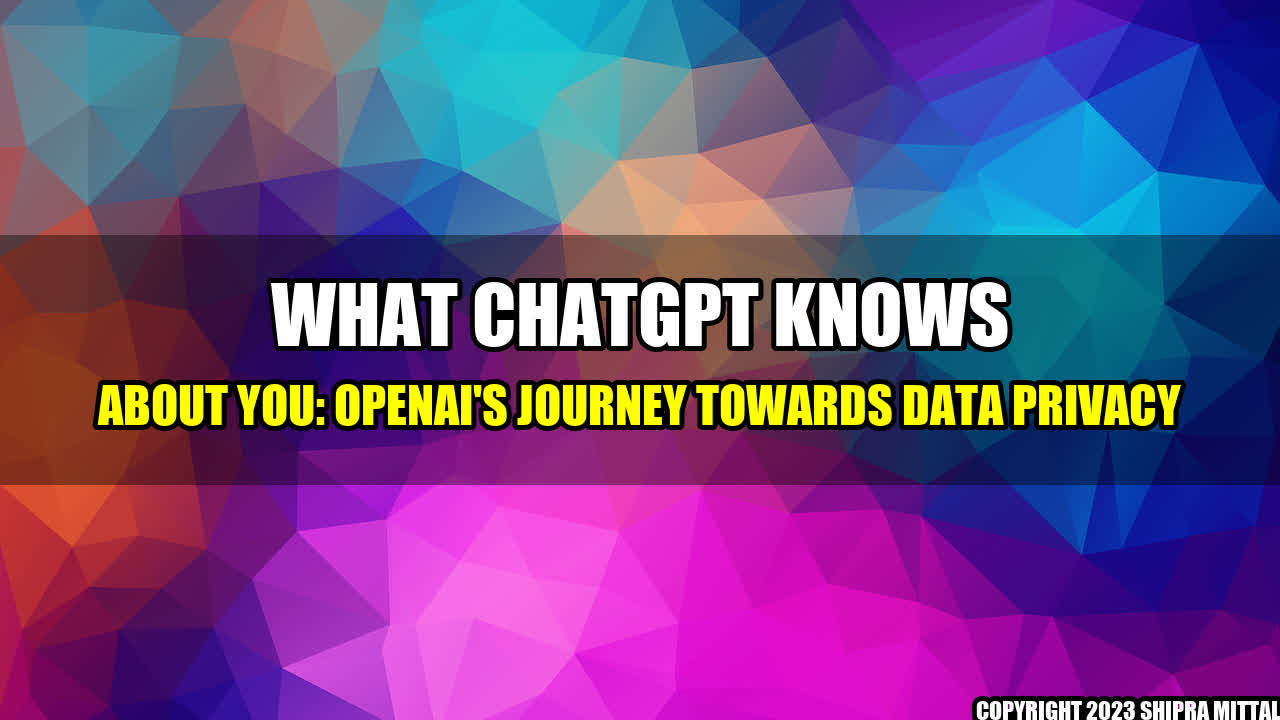Imagine you're having a conversation with a chatbot named ChatGPT. It responds to your questions in a human-like way, using natural language processing and artificial intelligence. You might ask it to book a restaurant for you, or help you plan your day. You might even confide in it, sharing your thoughts and feelings.
But what happens to all the data you're generating while chatting with ChatGPT? Who has access to it, and how is it being used?
These are crucial questions that OpenAI, the research organization behind ChatGPT, is grappling with as it seeks to balance the benefits of AI with the risks to privacy.
Why Data Privacy Matters
Data privacy is the right of individuals to control what information is collected about them, how it's used, and with whom it's shared. In the era of big data, where companies and governments are collecting and analyzing vast amounts of information about people, data privacy has become a hot-button issue.
For individuals, data privacy is a matter of personal autonomy and dignity. They should have the power to decide what information about them is shared, and for what purposes. Without data privacy, individuals can be vulnerable to discrimination, manipulation, and exploitation.
For organizations, data privacy is a matter of trust and accountability. They have a responsibility to protect the sensitive information they collect, and to use it in responsible and ethical ways. Without data privacy, organizations can face legal and reputational risks, as well as lose the trust of their customers.
OpenAI's Journey Towards Data Privacy
OpenAI was founded in 2015 with the goal of developing safe and beneficial AI. It has since become one of the leading research organizations in the field, with a focus on deep learning, reinforcement learning, and natural language processing.
One of OpenAI's most impressive accomplishments is the development of ChatGPT, a state-of-the-art chatbot that has been trained on massive amounts of text data to generate human-like responses. ChatGPT can convincingly mimic human conversations, and has a wide range of applications, from customer service to mental health therapy.
But as ChatGPT became more sophisticated, it also raised concerns about data privacy. ChatGPT is designed to learn from the conversations it has with users, which means it's constantly collecting and analyzing data about them. This data could potentially be used for nefarious purposes, such as targeted advertising or political manipulation.
To address these concerns, OpenAI has taken several steps to protect users' privacy:
- Open-sourcing the code for ChatGPT, so that anyone can inspect and audit it
- Using differential privacy techniques to add noise to the data collected by ChatGPT, making it harder to identify individual users
- Limiting the scope of ChatGPT's training data to avoid sensitive topics and information
- Providing users with clear information about what data is being collected and how it's being used
These measures are not perfect, and OpenAI acknowledges that there is always a risk of data breaches and misuse. But they represent a step forward in the quest for responsible AI that respects users' privacy and rights.
Practical Tips for Protecting Your Data Privacy
While OpenAI and other organizations are working to protect data privacy at a global level, there are also practical steps individuals can take to safeguard their own information:
- Use strong, unique passwords and enable two-factor authentication on all your accounts
- Be mindful of what information you share online, and with whom
- Use privacy-enhancing tools such as browser extensions and VPNs
- Read privacy policies carefully before agreeing to them
- Stay informed about the latest developments in data privacy and advocate for stronger regulations and protections
Conclusion
Data privacy is a fundamental human right that is increasingly at risk in a world of big data and AI. OpenAI's journey towards protecting users' privacy in the context of ChatGPT is an important step forward, but there is much more work to be done. By working together, individuals, organizations, and governments can create a more responsible and ethical AI future that respects privacy and autonomy.
"The best minds in the business are hard at work trying to understand how to protect the data that organizations collect, and how to balance that need with the public's right to privacy and security." - John W. Thompson, Chairman of the Board, Microsoft

Akash Mittal Tech Article
Share on Twitter Share on LinkedIn